Agile Testing Days 2011: DAY 1 – What a fabulous Day!
TweeterPosted by jc-Qualitystreet on 2011/11/19
The Agile Testing Days (Nov 14-17 2011) is the annual European conference for and by international professionals involved in the agile world. As the French Ambassador of the conference taking place this year in Potsdam (near Berlin), I couldn’t miss it. So, second participation, high expectations and absolutely NO DECEPTION!
This first day was I think my best conference day ever! So thanks to Jose Diaz, and his team, thanks to the speakers and participants.
After a very good full-day tutorial given by Jurgen Appelo (« Agile management: Leading Software professionals »…. a course that I do recommend in a 2 day format to all managers) and a dozen of games/exercises to try « At Home »…
the conference Day 1 opened with Johanna Rothman’s keynote…
Johanna Rothman « Agile testers and test managers: Now what? »
This keynote was the first of an impressive set of amazing presentations
Agile management is a hot topic to me since I do more and more agile coaching with line managers. I’ve explored the domain and of course already read Johanna’s books and articles. However, I found this « testing oriented » presentation very valuable.
Johanna first discussed the changing role of the testers in the agile organization. The agile tester looks like the First Class Tester (she previously described in 2003), as they, for example, work with developers from the very start of a feature…
« Testers ask questions… are curious »
The second part of the talk was dedicated to Agile Test managers…
« Agile test managers are leaders in the organization »
The key activities:
- Manage the project portfolio
- Remove organization obstacles
- Build trust relationships
- Lead hiring decisions and process
- Build the capacity of the organization
- Build communities of practice
Interesting thoughts
« Have management iterations » (To try!)
« Allow managers to see the system »
« Instead of individual reviews build a trusting relationships share the strategy share the profits »
« What keeps people in job? Trust »
« No micromanagement meet often one on one to build a trusting relastionship »
David Evans « What testers and developers can learn from each other? »
The presentation was efficient and David, as a good speaker, made a good use of analogies:
« Thinking you can improve quality by doing more testing is like thinking you can loose weight by weighing yourself more »
With ease, David focused both on things developers can help testers learn and things testers can help developers learn for the benefit of the whole team. The parallel was interesting. After pointing out ironically that ISTQB certification is mostly useless, David discussed common issues like coverage and concluded with things we all need to learn:
« Testers are friends »
« Teams need testers like people need friends » (I like that one!)
Rob Lambert « Do agile teams have wider awareness fields? »
« Not always »
but Agility gives you an environment to be a first class tester added finally Rob.
A good presentation that Rob was able to make interactive. I appreciated.
Rob started by introducing the concept of awareness and distinguished social and personal awareness, which was useful.
« Awareness is the ability to feel, perceive, know and be conscious of yourself and the world around you »
Other interesting thoughts…
« Awareness is the first step to change… »
« You need to know yourself and you team »
« You need to know your limits »
I like very much the idea of Learning Roadmap (closed but maybe richer than my To Learn List).
And finally, Rob pointed out the grower importance of social media and social tools (like twitter) as modern ways of widening awareness. I can just agree 🙂
Linda Rising « Who do you Trust? Beware of your brain »
Last year, I didn’t notice it immediately but Linda’s keynote gave me inspiration for a year. This time, once again, she did the job, and I must admit that emotion was in the air (and in me) at the end of her speech! She is a fantastic storyteller!
Based on experiments coming from the social sciences field, Linda shows us how quickly we categorize others, how quickly we naturally stereotype and label other people…
« We continually sort others into groups and out-groups »
The bad thing is that stereotypes and their expectations are not only a source of conflicts but also can affect performance…
« Stereotypes are prophetic »
The good thing when we look at the results of social experiments is that Humans like to be in small groups and quickly develop identity, no matter countries, cultural dimensions or even religions…
« This is the good news we like collaboration »
This is what we call Social Interdependence. The benefits?
- increased effort to achieve,
- positive relationships,
- improved psychological health…
And you know what? agile practices are practices that help. Therefore, sharing a common goal, as well as be trusted and respected are the keys.
« You don’t to be my best friend »
Linda ended her presentation with 2 good examples (« Trench warfare » and « primates ») showing reasons for hope and nothing is carved in the rock.
Huib Schoots « So you think you can test? »
This session wasn’t originally on the program. A good surprise! Huib is an experienced and passionate tester. His talk was dedicated to the factors that can help you to become a better tester. Huib listed three main activities:
- Adapt to context (context driven testing…)
« There is no best practice »
- Collaborate. Most of the job of the tester should be to ensure that the right testing is done (executing tests should be a small part of the activiy)
- Learn & Practice. Huib pointed out a set of learning options (Books, conferences, testing dojos, week end testing, pair testing, collaborative workshops, peer workshops…)
« You should train and practice »
« Be passionate » (to me, PASSION makes THE DIFFERENCE)
and one of my favorite quotation of the #AgileTD:
» If you want to do a good job I think you should invest in yourself »
And finally a good question, why don’t we have a Testing coach?
Gojko Adzic « Product Management using Effects Maps »
This session wasn’t originally on the program. A good surprise too! Gojko presented the Effect mapping, a visualization tool invented by Mijo Balic and Ingrid Ottersten.
Effect mapping supports product management activity by focusing on business goals. It enables high level project visualization, helps to deliver software iteratively (starting by the fastest simple way), and reduces user stories management issues…
« People horribly misuse user stories »
« As a system, I want… a system doesn’t want anything a system wants to sleep »
The starting point and the first level of the map is always the WHY (the business goal, how the business will be different 6 months from now if we achieve well).
Then, are drawn the next levels:
- WHO (can contribute to the business goal)
- HOW (can they help us)
- WHAT (we can do as a team to support this activity)
Once the map created, deliver the simplest thing to deliver (a path) and measure the effect (very similar to the Learn Startup approach introduced by Eric Ries…). IT should be seen as an investisment, not as a cost
The effect mapping, a tool to try…
Janet Gregory – Lisa Crispin « AppendixA: lessons learned since Agile testing was published »
We all know Lisa Crispin and Janet Gregory, authors of the famous Agile Testing book…

Lisa Crispin… later at night, at the party and ready to announce the award for the most influential agile tester of the year… DO YOU BELIEVE IT?
For this keynote, Janet and Lisa decided to discuss 5 Hot topics related to agile testing:
1 Feature Acceptance
Working feature by feature makes you often forget the global picture: during her talk, Janet used the puzzle analogy and stressed the necessity to understand the business value of a feature to deal with this issue and help prioritization. Establishing story tests but also defining story doneness, feature doneness are crucial.
2 Automation
Collaborate to automate and overcome impossible challenges. In term of test strategy, Lisa and Janet reminded us that context is everything, and so that for example, the well-known test pyramid should be adapted to the specific needs of each organization. According to them, « tests as documentation » is the only documentation guaranteed to be up to date… (as long as they run green).
3 Large Organizations – large Teams
In the case of large organizations, Janet and Lisa pointed out the necessity to consider other teams.
« You need to extend your family beyond your project team »
I totally agree! (see devops movement)
4 Distributed Teams
The world changes, and today’s the business is more likely distributed. A fact that I can easily confirm doing some agile coaching in various situation like French/ French distributed sites, French / Indian context or French/US/ German context. For such a context, my opinion is that reducing the distance is the key… Lisa and Janet presented 3 practices to succeed: establishing relationship, taking advantage of the technology (the virtual team member…) and experimenting!
5 Culture & Continuous learning
Agile is all in learning. Yeap!!! According to Lisa and Janet, culture is even more important that we thought: personal safety and allow people to make mistakes are essential. Janet insisted also on the important role of Play in the learning process. An element I am also convinced… as well as the necessity to be CURIOUS
« I really encourage you to be curious and learn new things »
« I like to see testers to be curious »
The last part of the talk was « attendees » oriented! Janet and Lisa wanted to hear about the stories of the attendees (« the Agile Testing book », « Testing dojos », « Twitter », « Tests & Feedback »…)
And Finally the Party to close the day
Some pictures of the funny party taking place in the evening (during when Gojko Adzic received the award for the most influential agile tester of the year). I enjoyed the show, the performers, the place, liked the beers and the discussions with the frenchies: Laurent, Gabriel, Patrice and Elalami…
So, MY ROTI (Return on time Invested) FOR THE DAY: 5
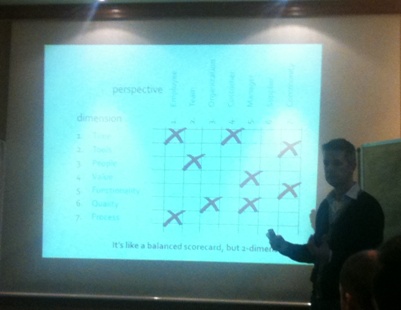
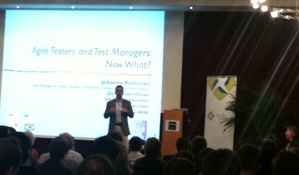
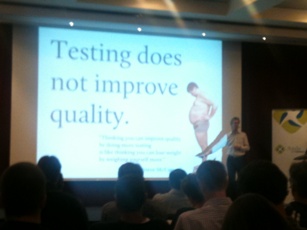
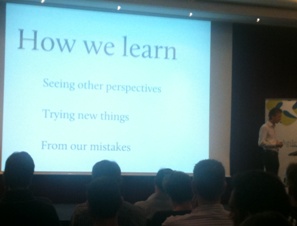
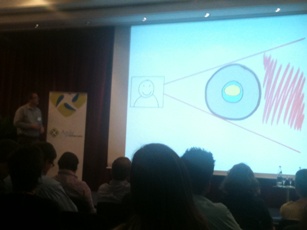
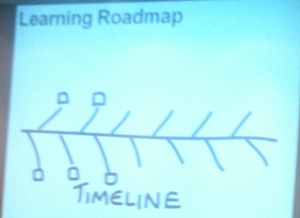
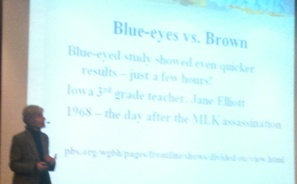
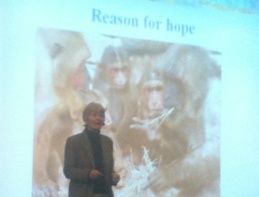
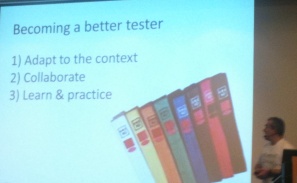
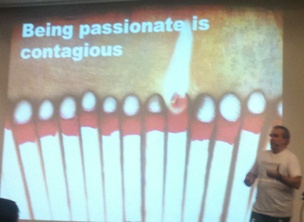


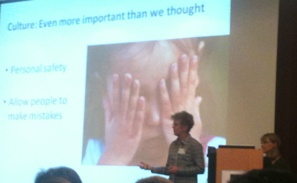



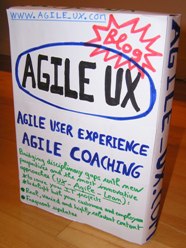
Stefan De Cap said,
Great summary of the first day. I’m already looking forward to your notes from day2!
A journey to #agiletd (1) | Arborosa said,
[…] or the conference and PaTS, but for now there is the following post by Jean Claude Grosjean; “Agile Testing Days 2011: Day 1 – What a fabulous day“ LD_AddCustomAttr(« AdOpt », « 1 »); LD_AddCustomAttr(« Origin », « other »); […]
Jogi said,
I absoluteley agree!
Laurent said,
I agree with your feedback. It was a great day !
I was happy to spend the night and enjoy german beers with you and the other frenchies as well 🙂
jc-Qualitystreet said,
Hey Laurent!
See you at Grenoble tomorrow…